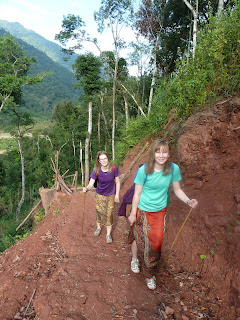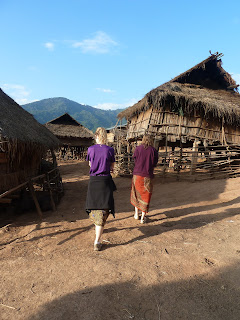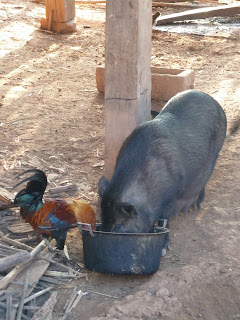After eating breakfast (more rice, surprise) and packing, we were off once again. The sun was shining, although we could see that the valley, where Muang Sing lays, was still covered in clouds, as it is every morning.
After an hour or so we reached the highest hill in the region, about 1850 meters above sea level. When we started walking downhill the landscape suddenly changed, and instead of walking in low grass (with thorns, everything had thorns) and chilling with the buffaloes and cows, we entered the jungle for real. We walked for almost three hours downhill, and with our muscles aching we almost (but only almost) missed walking uphill.... Then finally we came to the long awaited 'river'. Turns out it had been a bit too hyped, and was not much more then a stream. Anything would do in our sweaty state, and with no one watching we chose not to obey the 'only bathing in a sarong' -rule, and jumped in to the cold stream in our bikinis. No matter how we scrubbed we didn't feel quite clean, and putting on the same (completely soaked with sweat) clothes we now had walked in for two days, felt horrible.
Keo promised we would arrive at the Akha village, where we were to spend the night, in half an hour, so we tried to make ourselves representable by tieing our sarongs as skirts. For the first time, Keo approved of our clothing, and asked us why we had been wearing pants before. Uh, d'uh, because they are a lot more comfortable. Who would ever go trekking in a skirt?! All Lao women, was his response.
Well, we know why we didn't see any Lao women trekking. Turns out the half an hour to the village was once again spent walking vertically uphill. I do not recomend this in a sarong.
Once again soaked with sweat, we arrived at the village. The first thing we saw was a tiny school building, Keo informed us that kids here go to school when they are 6, 7 and 8 years old, after that they are done with school. Suddenly we where surrounded by kids showing us thumbs up and shouting 'Sabai Dee'.
The village was not big, consisting of 21 houses and with about 130 inhabitants. If the animals would have been counted there would for sure have been a lot more then 130 inhabitants, since wherever you looked there were pigs, dogs, chickens, goats, cows etc. running around. And even when you didn't look, you heard them...
The village is not reached in any other way then by foot (takes about 5 hours to reach the nearest road), and the path leading to the village is extreemly steep and quite difficult. Last night by the fire we had felt like we where the only people in the world. Now we felt like we where in the most remote village in the world. The villagers were also extreemly poor, and we had some trouble not knowing how to behave. We could communicate with no one, since they all spoke Akha, so the Lao we'd learnt from Keo last night was of no use to us. We could only observe the on-goings in the village, how the inhabitants behaved towards each other and the animals, how the children played and what the houses looked like.
The Akha live in houses built several meters above ground level, standing on poles. Under the houses lived the animals. The floorboards were so sparse that you could easily swipe leftovers and dirt down to the animals below. The family we stayed with had a big house with a steel roof (a couple houses had this, while the poorest families had houses with hay roofs), a big 'living room' with a fireplace and even a TV, though it was badly outdated and dusty. In the evening the generator would go on and Keo told us that someone had turned on their TV.
We have a hard time processing what we think about the village. Since we don't know, we can only wonder what the villagers think about their situation, what the teenagers want out of their lives and most importantly if they are happy. From what we saw, violence was very common. The kids were very violent towards each other, most probably because they were treated the same way by their parents. Many times we saw parents and older siblings threaten younger ones with a beating if they didn't stop crying or complaining. The parents were not so involved in the raising of their children, the older kids took care of the younger. A five-year-old carrying his three-year-old sibling was not and uncommon sight, even though he wasn't that much bigger, physically I mean. But the ones that suffered most from the abusive villagers were the animals. Though they were able to walk around freely and behave as they should (compared to for example caged chickens in Finland) they still were the ones lowest in the hierarchy. A child could lift up a pup by its tail and wave it around, only to drop it on the ground and walk away. The adults hit the pigs on the head when they came looking for food where they shouldn't and kicked the dogs that came inside. The children, of course, picked up on this and behaved the same, just more violently and just for fun. Guinea pigs (attached by strings to prevent them from running away) were popular soccer balls, for example. The sounds of hurting animals didn't seem to bother them. It sure did bother us, and we always looked or walked away when someone was abusing an animal in front of us (often, it seemed, to impress us).
For most of the day both the animals and villagers seemed rather afraid of us, (except for the kids making faces and shouting sabai dee) and we felt like complete outkasts.
When washing ourselves in our sarongs in the stream together with the other women and when sitting and drinking home made Laolao with the village men at night, we felt some sort of 'acceptance'. And when waking up at 5 a clock in the morning when the family got up and started making breakfast (we slept on their 'living room' floor. The house consisted of two rooms, the other one being the families bedroom) we felt rather privileged to be able to be part of family life, in a village that seemed to be stuck on the Middle Ages. However, when we ate first, and the family then ate our leftovers, or when 6 girls at the age of 15-18 gave us (an unwanted an painful) massage (It was part of the price, and the girls got paid, so Keo would not let us decline, although the situation made us very uncomfortable - we wanted to talk with them!) we did not feel 'part' of the village in any way. We had to try and remind ourselves that we brought money to the village, and therefore sort of did a good deed, although it didn't feel like it. Many of the villagers were sick and asked for medicine, but all we had to offer was a couple of books in Lao (which they didn't understand, since they spoke Akha..) and my 'fascinating' bracelets from H&M, which I donated to the girls in the family. (They were six girls, the oldest being 14 and the youngest 2. Their father complained about wanting a son...)
//Sophia & Hanna






























No comments:
Post a Comment